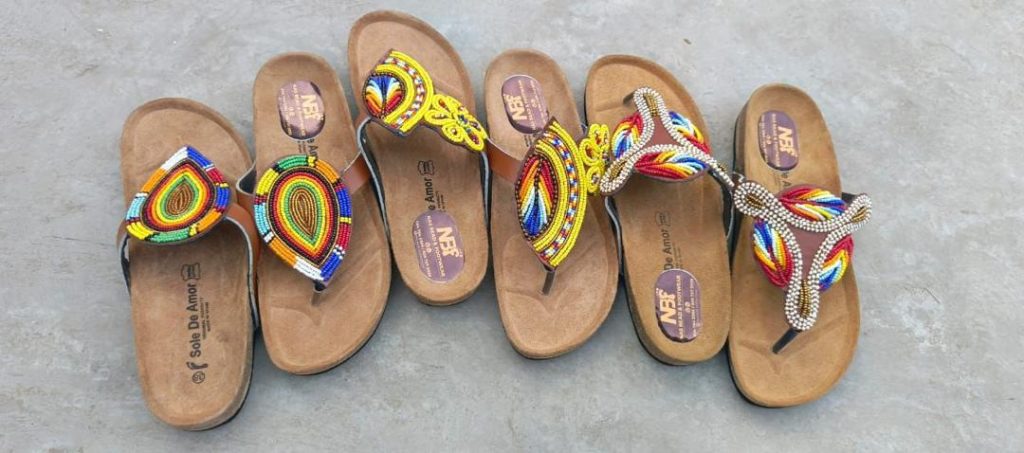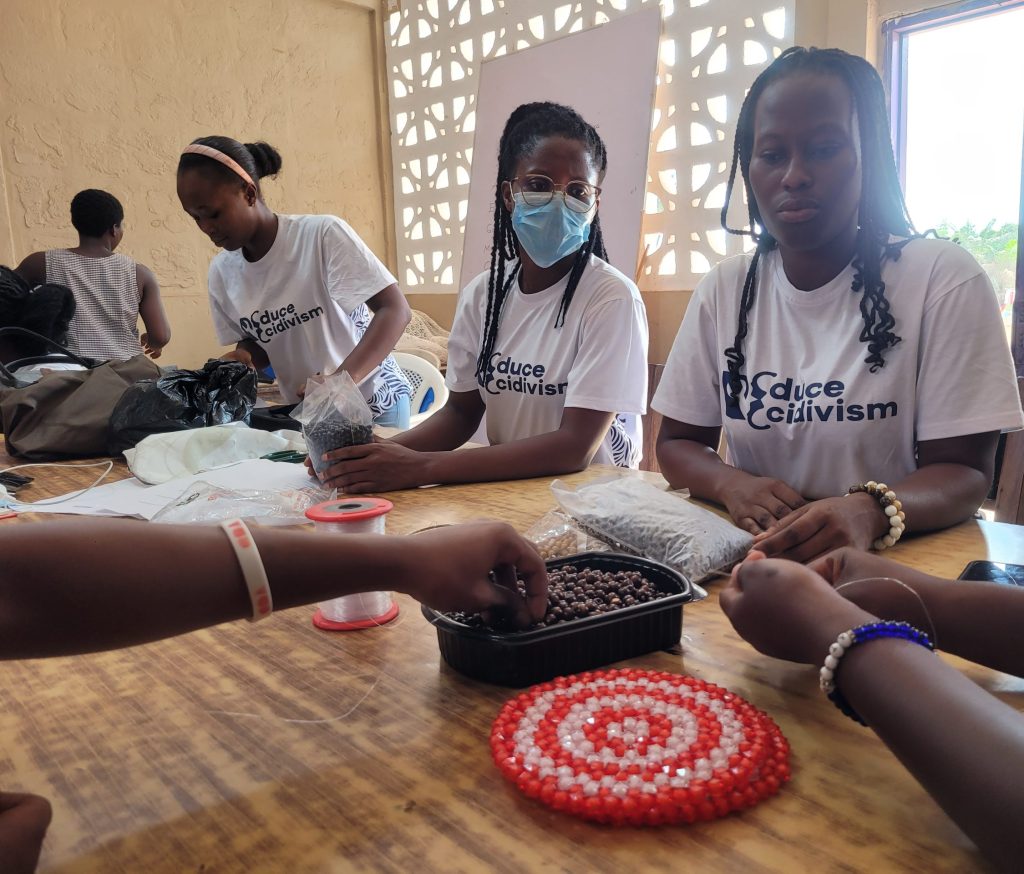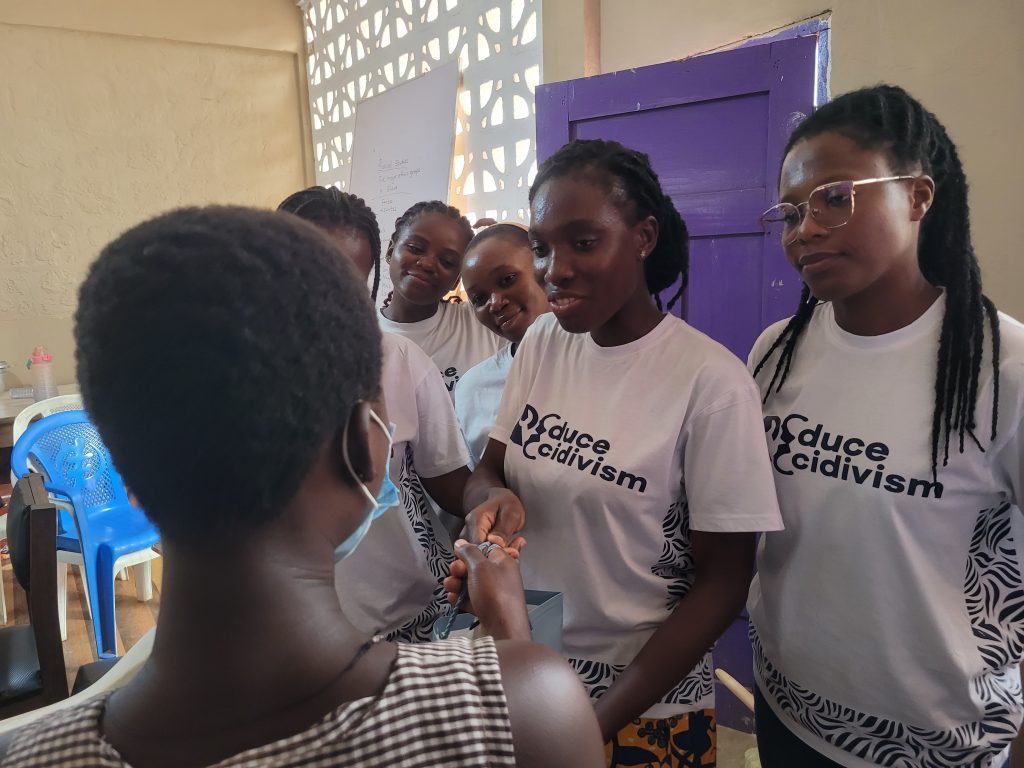Powering Change: Shoe-Making Training at the Junior Girls Correctional Center, Osu

On June 30, 2025, Reduce Recidivism Ghana delivered a powerful session in its ongoing Shoe-Making Training Series at the Junior Girls Correctional Center in Osu, Accra, Ghana. The workshop, led by Tracy Frimpong, brought together 15 young residents of the center for a hands-on experience designed to build practical skills and confidence. Participants were introduced to the fundamentals of sandal-making — including pattern tracing, synthetic leather cutting, strap design, and sole assembly. Using simple tools like scissors, rulers, and pre-cut templates, each girl had the opportunity to transform raw materials into finished footwear. More than just technical training, the session fostered focus, creativity, teamwork, and a renewed sense of self-worth. For many, it marked the first step toward realizing that their future can look very different with the right support and opportunities. This workshop is part of a dedicated vocational rehabilitation program by Reduce Recidivism Ghana, tailored specifically for the young ladies residing at the Junior Girls Correctional Center. The goal is to reduce reoffending by equipping them with practical, empowering skills that pave the way for reintegration, entrepreneurship, and long-term independence. The next session in the series will be held on Wednesday, July 17, 2025, and will focus on dressmaking, along with training in entrepreneurship and business development — extending the holistic approach that merges technical skill with business mindset. Reduce Recidivism Ghana is proud to stand alongside these young women as they take steps toward brighter, self-determined futures. How You Can Help? The work is just beginning. Every donation, volunteer, or shared story helps move the mission forward. Whether it’s sponsoring a tool kit or mentoring a participant, your support creates real opportunities for change. To get involved, visit our Support Us page or follow us on social media for updates. Together, we can reduce recidivism — one skill, one story, one life at a time.
Privacy Policy
Effective Date: January 1, 2025Last Updated: June 27, 2025 Reduce Recidivism is committed to protecting the privacy of every visitor, donor, volunteer, and supporter. This Privacy Policy outlines how we collect, use, and protect your information when you interact with our website and services. By using our website, you agree to the terms of this Privacy Policy. 1. Information We Collect We may collect the following types of personal and non-personal information: a. Personal Information b. Non-Personal Information This data helps us improve our services and understand how visitors use our website. 2. How We Use Your Information We use the information collected for the following purposes: 3. How We Protect Your Information We implement appropriate security measures to protect your data from unauthorized access, alteration, or disclosure. This includes: However, no method of transmission over the internet is 100% secure, and we cannot guarantee absolute security. 4. Third-Party Services We may use third-party tools and services (e.g., payment processors, email newsletter platforms, analytics tools) that may collect and process your information. These services are required to follow strict data protection standards, but we encourage you to review their individual privacy policies. We do not sell, rent, or trade your personal information to third parties. 5. Cookies and Tracking We may use cookies and similar technologies to enhance your browsing experience. You can choose to disable cookies in your browser settings, though this may affect functionality. 6. Your Rights and Choices You have the right to: To make any of these requests, please contact us at [insert email address]. 7. Children’s Privacy Our website is not directed at children under the age of 13. We do not knowingly collect information from minors without consent from a parent or guardian. If we become aware that we have inadvertently collected personal data from a child, we will take appropriate steps to delete it. 8. Changes to This Privacy Policy We may update this Privacy Policy from time to time to reflect changes in our practices or legal requirements. Updates will be posted on this page with a revised effective date. 9. Contact Us If you have any questions or concerns about this Privacy Policy, please reach out to us at: Reduce RecidivismEmail: info@reducerecidivismgh.orgPhone: 0541821770Location: Accra, Ghana
Beads of Hope: Empowering Girls Through the Art of Beadmaking

By the Reduce Recidivism Team | Posted: May 7, 2025 In a bright room filled with laughter, concentration, and colorful beads, a group of young girls sit in a circle, stringing hope one bead at a time. For many of these girls, this is the first time they’ve ever felt proud of something they created with their own hands. At Reduce Recidivism, beadmaking has become more than just a vocational skill — it’s a tool for healing, creativity, and empowerment, especially for girls in Ghana’s juvenile correctional system. A Safe Space to Heal and Grow Girls in correctional centers often carry heavy emotional burdens — from trauma, rejection, and societal judgment. Beadmaking offers a safe and nurturing space where they can express themselves, develop patience, and discover hidden talents. “Beadmaking helps me focus,” says Adwoa*, a 16-year-old participant. “When I create something beautiful, I feel like I can be someone new — not who I was before.” The calm, rhythmic process of selecting colors, stringing patterns, and completing a finished bracelet or necklace becomes therapeutic. It teaches not only artistry but also discipline and attention to detail. Crafting a Future Beyond the Walls Beyond its emotional impact, beadmaking is a marketable skill. In many parts of Ghana, handmade jewelry has cultural and commercial value. By learning how to craft, price, and package their work, the girls gain entrepreneurial skills that they can carry into the world after their release. With support from Reduce Recidivism, some girls begin selling their pieces at local fairs, churches, and community events. The income, though small, symbolizes something far greater — independence and a fresh start. Redefining Identity, Restoring Dignity For many of these girls, their identities have been shaped by past mistakes or circumstances beyond their control. Beadmaking gives them a new story to tell — one of creativity, resilience, and transformation. “We want them to see themselves not as ex-offenders, but as artists, businesswomen, and change-makers,” says Tracy Frimpong, founder of Reduce Recidivism. The program also works to connect the girls with female mentors and role models, reinforcing the belief that their lives are valuable and their futures worth investing in. How You Can Support Reduce Recidivism relies on donors and partners to provide beadmaking supplies, workshop spaces, and mentorship support. You can help by: Every bracelet made is a symbol of possibility — and every girl trained is one step closer to reclaiming her life with purpose and pride. Bead by bead, we’re stringing together new beginnings. *Names changed to protect privacy.
Restoring Hope Behind Bars: How Vocational Skills are Changing Young Lives

By the Reduce Recidivism Team | Posted: April 15, 2025 In a quiet workshop tucked inside a juvenile correctional center in Accra, 17-year-old Kobby* leans over a wooden frame, carefully smoothing its edges. Just a year ago, Kobby was filled with anger and despair. Today, he’s building furniture — and a future. Kobby is one of dozens of young people who have joined Reduce Recidivism’s vocational training program, an initiative designed to equip juveniles with practical skills and a renewed sense of purpose. A Second Chance In Ghana, juvenile offenders often face stigma, rejection, and limited options after release. Without support, many reoffend, repeating a cycle of crime and incarceration. Reduce Recidivism, founded in January 2025 by youth advocate Tracy Frimpong, seeks to break that cycle. “We believe transformation is possible when young people are given not just punishment, but tools to rebuild their lives,” Tracy says. Through hands-on training in trades such as tailoring, carpentry, and bead-making, participants like Kobby learn more than just a skill — they rediscover dignity. More Than Skills: Building Confidence Each training session is paired with life skills workshops on communication, self-discipline, and emotional resilience. Volunteer mentors walk alongside participants, offering encouragement and guidance. “When I saw people believe in me again, I started to believe in myself,” says Ama*, a recent graduate who now runs a small hairdressing business in her community. From Centers to Communities The impact of the program extends beyond the walls of correctional centers. Families report improved relationships. Communities notice positive change. And most importantly, young people are staying out of trouble and choosing new paths. Reduce Recidivism also works with local leaders and employers to reduce the stigma faced by formerly incarcerated youth. “We must create space for redemption,” Tracy adds. “Our communities are stronger when we restore, not reject.” How You Can Help The work is just beginning. Every donation, volunteer, or shared story helps move the mission forward. Whether it’s sponsoring a tool kit or mentoring a participant, your support creates real opportunities for change. To get involved, visit our Support Us page or follow us on social media for updates. Together, we can reduce recidivism — one skill, one story, one life at a time. *Names changed to protect privacy.

